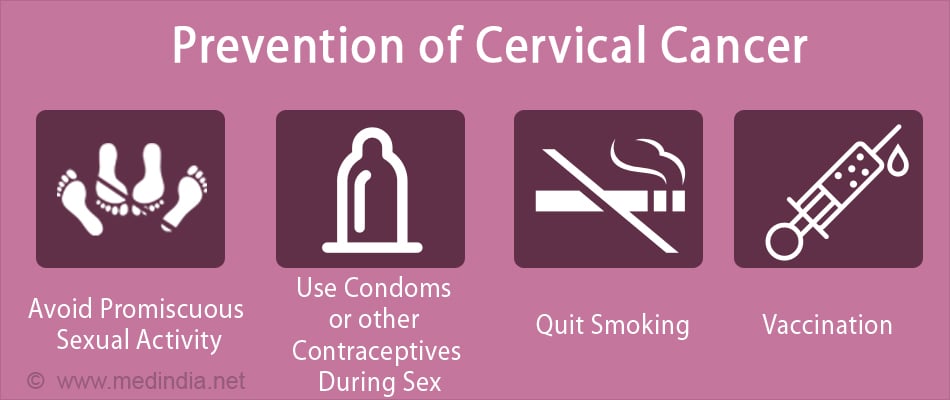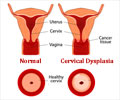Treatment & Prevention of Cervical Cancer
What are the Stages and Treatment of Cervical Cancer?
Stage 0
Cancer cells are confined to the surface of the cervix. This stage is also called carcinoma in situ (CIS)
There are four treatment options for this early-stage tumor.
- A LEEP (Loop Electrosurgical Excision Procedure) is similar to a cone biopsy and is for both diagnostic and therapeutic indications. It is usually performed in the office with a local anesthesia with only rare side effects.
- A cervical cold-knife conization is performed when a LEEP is not appropriate-usually for recurrent disease or difficult anatomy.
- Laser vaporization therapy is usually done for larger lesions.
- Freezing the cervix (cryotherapy) can be performed in the doctor's office and has a negligible complication rate.
- In stage I cervical cancer, the cancer has grown deeper into the cervix, but has not spread beyond it.
Standard Treatment
The treatment of choice for stage IA1 disease is surgery.
Total hysterectomy, radical hysterectomy, and conization are accepted procedures.
Lymph node dissection is not required if the depth of invasion is less than 3 mm and no invasion into lymphatic tissue is present.
Stage II cervical cancer
Stage II cervical cancer means that the cancer has grown beyond the cervix and uterus, but has not reached the walls of the pelvis or the lower part of the vagina.
Standard Treatment
External beam radiation or a radical hysterectomy with removal of lymph nodes is followed by interstitial radiation with chemotherapy.
Women with large lesions are managed with hysterectomy, lymph node dissection or preoperative radiation therapy.
External beam radiation is applied to the pelvis or sometimes the para-aortic region after surgery for women who have metastatic disease in the lymph nodes
Treatment under Investigation
Studies have found a new radiation therapy called brachytherapy which allows for shorter treatment times in an outpatient setting. Studies are also done on hyperthermia, which uses both radiation therapy and heat
Stage III cervical cancer
Stage III cervical cancer means that the cancer has spread to the lower part of the vagina or the walls of the pelvis, but not to nearby lymph nodes or other parts of the body.
Standard Treatment
Chemotherapy along with external beam radiation followed by interstitial radiation therapy is the best treatment method to be followed
Stage IV cervical cancer
In this cervical cancer stage, the disease has spread to nearby organs or other parts of the body.
Standard Treatment
Radiation may be used to relieve the symptoms of pelvic disease or isolated distant metastases. Several chemotherapy drugs are useful for treating cervical cancer, but they are rarely curative. They include cisplatin or carboplatin. Combination chemotherapy, including cisplatin + etoposide + bleomycin, has a response rate of about 50 percent
Side effects of radiation and chemotherapy like vomiting, fatigue, diarrhea and hair loss may be observed.
What are the Complications of Cervical Cancer?
- Cervical cancer is known to make the blood more prone to forming clots, a risk that increases with the addition of surgery and bed rest. If these clots break loose and travel to the lungs, they can cause a potentially fatal pulmonary embolism.
- A fistula or abnormal connection may develop between the bladder and vagina or vagina and rectum, causing a persistent discharge of fluid from the vagina.A fistula can also sometimes develop after radiation treatment.
- A condition called hydronephrosis might occur in which a tumor pressing against the ureters will block urine from exiting the kidneys after it has been filtered. This will cause the kidneys to stretch or swell.
- Damage to the vagina, bowel, or bladder caused by cervical cancer can increase the risk of bleeding.
How Can We Prevent Cervical Cancer?
Cervical cancer, which occurs mostly in the sexually-active women, can be prevented by routine screening and by avoiding the risk factors

Preventing a disease generally involves avoiding its risk factors although such avoidance does not guarantee that the disease will not develop. Some of the common preventive measures are listed below:
- Avoiding promiscuous sexual activity: The HPV, which is associated with cervical cancer, is usually transmitted from one person to another through sexual activity. Women who have had multiple sex partners are more likely to develop the disease. It is therefore advisable to restrict the number of sex partners
- Using condoms or other barriers during sex: Usage of condoms during sex helps to control the onset of cervical cancer
- Quit smoking: Heavy smoking should be avoided or reduced, as women who smoke are more likely to develop cervical cancer than non-smokers
- Diet: Studies suggest that regular intake of certain micronutrients like vitamins or minerals helps to prevent the onset of cervical cancer
- Regular Pap smear: Routine screening in the form of Pap tests must be carried out to detect cervical cancer in the early stages
- Vaccination: The high incidence of cervical cancer in India has induced the government to liaise with the multi-national company. A multinational pharma company has produced a vaccine against cervical cancer,.The vaccine, called Gardasil (Recombinant human papillomavirus vaccine), is available in the markets of several countries.
Cervical Cancer - Social Issues
Creating Awareness: In the West, celebrities have, to a large extent, influenced public perception regarding screening for cancer.
Becky Hammond, a noted basketball player has been spreading awareness of cervical cancer through her active participation in a program called ' Choose to know'.
'Saturday Night Live' famous Julia Sweeney is one of those few who have managed to conquer cervical cancer. In 1995, she lost her brother to cancer. Before she could even recover from his death, she was diagnosed with cervical cancer. Her perseverance and determination helped her undergo complete hysterectomy and sail through 12 months of radiotherapy. A play representing the power of her way- 'God Said, Ha!' not only portrays her successful battle, but also promises to be an inspiration for a million other cervical cancer survivors worldwide.
In India too, awareness campaigns, with active participation from prominent personalities from all walks of life, is the need of the hour as cancer of cervics is a serious public health issue which can be prevented by eliminating ignorance.
Cervical cancer is an ever-increasing danger, posing a grave health threat to our country and other developing countries. This form of cancer is prevalent especially among the rural women due to several factors such as early exposure to marriage and sex, multiple pregnancies, and restricted use of condoms, to name a few. It is therefore essential to draw the attention of the public through warnings to the hazards posed not only by AIDS but also by other life-threatening diseases like cervical cancer.
Celebrities and cancer on one side, it would not be possible to curb this dreadful disease, which has been haunting the global healthcare scenario without a consistent individual and community participation. One should not have a screening because a celebrity says you should. It should rather be an informed decision made between an individual and the physician, taking into consideration personal medical history and the risk ratio.

















What is the symtoms of having cervical cancer?
can penis penetrate into the cervix kind regards
What is the incidence of ca cx in India in 2010? kindly support with references.
Cervirax is considered to be effective before any contact with semen, but if somebody is using coitus interruptus method of contraception is it of any use or not????
The vaccines Gardasil and Cervarix won't reduce cancer incidence or deaths. They will divert hundreds of billions of health care dollars to the coffers of pharmaceutical companies.
HPV infections, advertised to be the cause of cervical cancer, are slow and handled by our immune systems in over 90% according to the CDC/FDA/American Cancer Society
Women who don't clear HPV infection have immune problems caused by nutritional deficiencies, toxic exposure, toxin ingestion or genetics.
If an immune system can't clear an HPV infection no vaccine can help. Vaccines are passive targets and can't fix an immune system unable to identify or destroy HPV
HPV is controlled by intracellular immune response. Vaccine stimulate the humoral, antibody, response. Antibodies fight bloodborne infections and will not appreciably affect the rate of cervical HPV infections and CANNOT combat an active HPV infection
This will be proved in 20 years when vaccines are shown to have failed
You're correct in stating that the vaccines will not combat those already infected. However, they have been proven to prevent infection of the HPV strains 6,11,16, and 18. Women don't have to have an "immune problem" caused by toxins, etc. to not clear the infection.I suggest you check your facts before posting such erroneous statements.
I made no errors. Over 90% of us clear all HPV infection without drugs doctors or vaccines [FDA], a properly functioning immune system doing it's job. Chronic infection is caused by an immune system problem as I described
Gardasil has NOT been proven to prevent HPV infection, except by conflicted Merck research
A humoral response cannot prevent HPV infection of epithelial tissue, but cell mediated response can. Vaccines to provoke a cell mediated response are being developed. Until then Merck will be defrauding its customers with your help
Gardasil is the largest medical fraud in history perpetrated by Merck, maker of Vioxx and Pargluva, their two previous medical frauds.
Less than 1% of women chronically infected with HPV develop cervical cancer. This is not a cause and effect relationship. Read the Markovics' (oncologists) opinion that HPV and cervical cancer are together merely by coincidence, due to HPV being common and cervical cancer being rare.